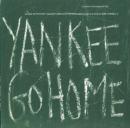According to Mahan, we need a navy;
According to Teddy, we need a navy;
According to Hearst, we need a navy – (*)
And we'll float it in an ocean of blood.
But a lot of us here, don't want a navy;
A lot of us here are opposed to a navy;
For conscience forbids the growth of a navy,
And tinting the sea with innocent blood.
So Mahan's books will cry for a navy,
And Hearst and his paper will lie for a navy,
And Teddy is willing to die for a navy,
But the soul of our nation will stand the blame.
Our nation was founded because of oppression;
Our forefathers died fighting oppression,
But now they’d have us believe there's no sin and oppression
Nor living in the shadow of shame.
But you can't have a navy without foreign bases,
Strong tho' we be, we have no foreign bases,
Say the unholy three, unto you and me:
"We’ll merely confiscate some foreign bases."
And once we embark in this primeaval mission;
Once we take part in the primeaval mission,
We'll never erase the stain of suspicion,
In a world of hostile nations.
So let's do away with this dream of a navy,
The forgeit of honor isn't worth a mighty navy,
Respect is a weapon much greater than a navy,
For the soul of our nation will stand the blame.
According to Teddy, we need a navy;
According to Hearst, we need a navy – (*)
And we'll float it in an ocean of blood.
But a lot of us here, don't want a navy;
A lot of us here are opposed to a navy;
For conscience forbids the growth of a navy,
And tinting the sea with innocent blood.
So Mahan's books will cry for a navy,
And Hearst and his paper will lie for a navy,
And Teddy is willing to die for a navy,
But the soul of our nation will stand the blame.
Our nation was founded because of oppression;
Our forefathers died fighting oppression,
But now they’d have us believe there's no sin and oppression
Nor living in the shadow of shame.
But you can't have a navy without foreign bases,
Strong tho' we be, we have no foreign bases,
Say the unholy three, unto you and me:
"We’ll merely confiscate some foreign bases."
And once we embark in this primeaval mission;
Once we take part in the primeaval mission,
We'll never erase the stain of suspicion,
In a world of hostile nations.
So let's do away with this dream of a navy,
The forgeit of honor isn't worth a mighty navy,
Respect is a weapon much greater than a navy,
For the soul of our nation will stand the blame.
Contributed by Alessandro - 2010/3/31 - 11:04
(*) William Randolph Hearst (1863–1951), uomo d’affari, magnate della carta stampata ed influente uomo politico statunitense. Alla sua figura si ispirò Orson Welles per il suo capolavoro “Citizen Kane” (1941).
Alessandro - 2010/3/31 - 11:05
×
![]()
Note for non-Italian users: Sorry, though the interface of this website is translated into English, most commentaries and biographies are in Italian and/or in other languages like French, German, Spanish, Russian etc.




Album “Yankee Go Home: Songs of Protest Against American Imperialism”, Folkways Records.
Nel 1907 il presidente Roosevelt volle “mostrare i muscoli” dell’America al mondo e inviò una flotta di 16 navi da guerra, la “Grande Flotta Bianca”, a circumnavigare il globo. La prova di forza iniziò il 16 dicembre 1907 e si concluse il 22 febbraio del 1909. L’evento costituì anche il coronamento della carriera dell’ammiraglio Alfred Thayer Mahan (1840-1914), uno dei principali artefici dell’egemonia militare e dell’imperialismo americano.
“In 1886, then Captain Alfred T. Mahan delivered a series of lectures at the Naval War College which were published ln 1890 as "The Influence of See Power upon History”. In this book Mahan argued that Americans must begin to look outward, that they must build foreign markets, expand the merchant marine to service them and construct a strong navy to protect them. Mahan had a profound influence on many Americans, among them the young Theodore Roosevelt, soon to be an Assistant Secretary of the Navy, who completely shared Mahan's enthusiasm for the build-up of a strong navy and deeper involvement in foreign affairs. Mahan's influence was so persuasive that by 1900, five heavy duty battleships, including the MAINE, were constructed and the government announced its intention of creating a navy that could meet a potential enemy anywhere on the high seas. By 1900, the U.S. Navy grew from twelfth place to number three among naval powers and the race for imperialism - of new bases and coaling stations for the fleet, of a shorter way to get from the Atlantic to the Pacific, of an even larger navy to protect the new bases, and of never bases to service the larger navy - was on.”
(dalla nota introduttiva al brano dal libretto che accompagna l’album)